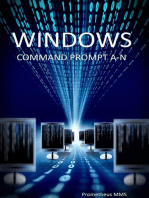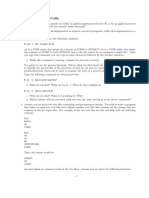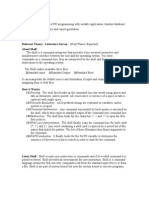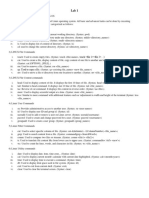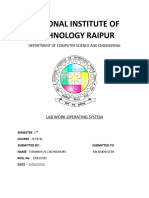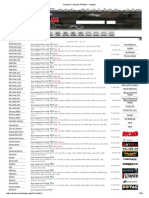What Are The Different Standard Given by POSIX ? What Is POSIX ?
Uploaded by
Avishek NandiWhat Are The Different Standard Given by POSIX ? What Is POSIX ?
Uploaded by
Avishek NandiSubject: UNIX & Shell Programming Subject Code: BSIT - 43
Assignment: TB (Compulsory)
PART - A
1. What are the different standard given by POSIX ? What is POSIX ?
POSIX standards are formally designated as IEEE 1003 and the international standard name is ISO/IEC 9945. The standards, formerly known as IEEE-IX, emerged from a project that began circa 1985. Richard Stallman suggested the name POSIX in response to an IEEE request for a memorable name.[2]
POSIX :POSIX or "Portable Operating System Interface for Unix"[1] is the name of a family of related standards specified by the IEEE to define the application programming interface (API), along with shell and utilities interfaces, for software compatible with variants of the Unix operating system, although the standard can apply to any operating system.
5. What happens if a directory permission changed?
if a directory permission changed then the user or Group or other may not be Read, Write or Execute by changing the permission using commands such as -rw-r--r--, chmod etc.
Read (r) Write (w) Execute (x)
TABLE 1. UNIX DIRECTORY Permissions WHO USER Read (r) Write (w) Execute (x) GROUP Read (r) Write (w) Execute (x) WHAT THE PERMISSIONS ALLOW The account owner can list the files in the directory. The account owner can create or delete files in the directory. access files in that directory by name (such as Web page files). Everyone in the designated group can list the files in the directory. Everyone in the group can create or delete files in the directory. Everyone in the group can change (cd) into the directory and access files in that directory by name (such as Web page files). Anyone can list the files in the directory. Anyone can create or delete files in the directory. Anyone can change (cd) into the directory and access files in that directory by name (such as Web page files).
OTHER Read (r) Write (w) Execute (x)
4. What is script command, with command explain how to create script file of a session?
script is used to take a copy of everything which is output to the terminal and place it in a log file.
% less hw0.scr Script started on Wed Sep 06 09:34:14 2000 % ls hw0.scr square.scm
% cat square.scm ;; your name ;; your id ;; your section # or time ;; square takes a number as an input parameter and ;; returns the square of it. (define (square x) (* x x)) % module load soft/tcl % stk Welcome to the STk interpreter version 4.0.1 [SunOS-5.7-sun4] Copyright 1993-1999 Erick Gallesio - I3S - CNRS / ESSI STk> (load "square.scm") STk> square #[closure arglist=(x) 11b158] STk> (square 3) 9 STk> (square -5) 25 STk> (square 0.1) 0.01 STk> (square 0.00000001) 1e-16 STk> (square 'a) *** Error: *: not a number: a STk> (square 1) 1 STk> (square (square 3)) 81 STk> (exit)
% exit script done on Wed Sep 06 09:35:20 2000
6. How do you yank and paste lines?
The command 'Y' or 'yy' copies (yanks) one or more lines. To copy one line, two lines, 10 lines, and all lines to the end of the file, respectively: Y 2Y 10Y yG To paste the text contained in the buffer above (uppercase P) or below the current cursor position (lowercase p), respectively: P p It is also possible to yank text within a line. The following commands yank text from the current cursor position to the end of the word and the end of the line, respectively: yw y$ The same commands paste the text within a line. Lower case p pastes after the cursor position and upper case P pastes before. Paste will also work with deleted text, either lines or parts of lines. Be careful not to execute any other commands prior to pasting as this will empty the buffer.
9. Write general syntax of CASE statements.
The basic syntax of the case...esac statement is to give an expression to evaluate and several different statements to execute based on the value of the expression. The interpreter checks each case against the value of the expression until a match is found. If nothing matches, a default condition will be used.
case word in pattern1) Statement(s) to be executed if pattern1 matches ;; pattern2) Statement(s) to be executed if pattern2 matches ;; pattern3) Statement(s) to be executed if pattern3 matches ;; esac
10. What is a process ? Name two important attributes of a process.
A process under unix consists of an address space and a set of data structures in the kernel to keep track of that process. The address space is a section of memory that contains the code to execute as well as the process stack.
Two important attributes of a process:PID - The PID stands for the process identification. This is a unique number that defines the process within the kernel. PPID - This is the processes Parent PID, the creator of the process.
You might also like
- Shell Scripting Interview Questions and AnswersNo ratings yetShell Scripting Interview Questions and Answers7 pages
- M.A.M. School of Engineering: Siruganur, Trichy - 621 105No ratings yetM.A.M. School of Engineering: Siruganur, Trichy - 621 10578 pages
- Lab04 - Introduction To Shell ProgrammingNo ratings yetLab04 - Introduction To Shell Programming7 pages
- 19CS2106S 19CS2106A Test - I Set - 1 Key and SchemeNo ratings yet19CS2106S 19CS2106A Test - I Set - 1 Key and Scheme8 pages
- Cse-IV-unix and Shell Programming (10cs44) - SolutionNo ratings yetCse-IV-unix and Shell Programming (10cs44) - Solution57 pages
- 84227127-6T-CMOS-SRAM-CELL-Design-ReportNo ratings yet84227127-6T-CMOS-SRAM-CELL-Design-Report25 pages
- UNIX Shell Scripting Interview Questions, Answers, and Explanations: UNIX Shell Certification ReviewFrom EverandUNIX Shell Scripting Interview Questions, Answers, and Explanations: UNIX Shell Certification Review4.5/5 (4)
- Practical Reverse Engineering: x86, x64, ARM, Windows Kernel, Reversing Tools, and ObfuscationFrom EverandPractical Reverse Engineering: x86, x64, ARM, Windows Kernel, Reversing Tools, and ObfuscationNo ratings yet
- UNIX Shell Programming Interview Questions You'll Most Likely Be AskedFrom EverandUNIX Shell Programming Interview Questions You'll Most Likely Be AskedNo ratings yet
- Banking Sector Reforms FULL REPORT - 1 - Commerce Seminar TopicsNo ratings yetBanking Sector Reforms FULL REPORT - 1 - Commerce Seminar Topics2 pages
- Marketing Mix: Anindya Mondal, School of Management Sciences ID No. 265113012, 2 SemNo ratings yetMarketing Mix: Anindya Mondal, School of Management Sciences ID No. 265113012, 2 Sem15 pages
- NBFC's and BANK: Service Operations ManagementNo ratings yetNBFC's and BANK: Service Operations Management15 pages
- What Is Your Name?: Thank You Very Much For Your SuggestionNo ratings yetWhat Is Your Name?: Thank You Very Much For Your Suggestion2 pages
- Marketing Management: Q.1 Explain The Meaning of Marketing and Its Importance in BusinessNo ratings yetMarketing Management: Q.1 Explain The Meaning of Marketing and Its Importance in Business0 pages
- Rabin Karp Algorithm of Pattern Matching (Goutam Padhy)No ratings yetRabin Karp Algorithm of Pattern Matching (Goutam Padhy)15 pages
- Preview of ISO 9001:2015 QSP 7.1-02 Control of Infrastructure Quality Procedure50% (2)Preview of ISO 9001:2015 QSP 7.1-02 Control of Infrastructure Quality Procedure4 pages
- Practical:-1 (A) : Aim: Case Study On "Google Earth"No ratings yetPractical:-1 (A) : Aim: Case Study On "Google Earth"14 pages
- Chapter 14 Association Rules Collaborative FilteringNo ratings yetChapter 14 Association Rules Collaborative Filtering34 pages
- Xfaas: Hyperscale and Low Cost Serverless Functions at MetaNo ratings yetXfaas: Hyperscale and Low Cost Serverless Functions at Meta16 pages
- Livestock Management For Animals Using Android Application: A Project ReportNo ratings yetLivestock Management For Animals Using Android Application: A Project Report32 pages
- LTM Fundamentals Exercise Guide - Partners - V13.0.KNo ratings yetLTM Fundamentals Exercise Guide - Partners - V13.0.K193 pages
- VMware VSphere Optimize and Scale 6.5 - Lab100% (1)VMware VSphere Optimize and Scale 6.5 - Lab150 pages
- Developing An Activity-Based Knowledge Management System For ContractorsNo ratings yetDeveloping An Activity-Based Knowledge Management System For Contractors22 pages
- 18.330 Lecture Notes: Integration of Ordinary Differential EquationsNo ratings yet18.330 Lecture Notes: Integration of Ordinary Differential Equations24 pages
- M.A.M. School of Engineering: Siruganur, Trichy - 621 105M.A.M. School of Engineering: Siruganur, Trichy - 621 105
- 19CS2106S 19CS2106A Test - I Set - 1 Key and Scheme19CS2106S 19CS2106A Test - I Set - 1 Key and Scheme
- Cse-IV-unix and Shell Programming (10cs44) - SolutionCse-IV-unix and Shell Programming (10cs44) - Solution
- UNIX Shell Scripting Interview Questions, Answers, and Explanations: UNIX Shell Certification ReviewFrom EverandUNIX Shell Scripting Interview Questions, Answers, and Explanations: UNIX Shell Certification Review
- The 101 Most Important UNIX and Linux CommandsFrom EverandThe 101 Most Important UNIX and Linux Commands
- C# Package Mastery: 100 Essentials in 1 Hour - 2024 EditionFrom EverandC# Package Mastery: 100 Essentials in 1 Hour - 2024 Edition
- Practical Reverse Engineering: x86, x64, ARM, Windows Kernel, Reversing Tools, and ObfuscationFrom EverandPractical Reverse Engineering: x86, x64, ARM, Windows Kernel, Reversing Tools, and Obfuscation
- UNIX Shell Programming Interview Questions You'll Most Likely Be AskedFrom EverandUNIX Shell Programming Interview Questions You'll Most Likely Be Asked
- MVS JCL Utilities Quick Reference, Third EditionFrom EverandMVS JCL Utilities Quick Reference, Third Edition
- Banking Sector Reforms FULL REPORT - 1 - Commerce Seminar TopicsBanking Sector Reforms FULL REPORT - 1 - Commerce Seminar Topics
- Marketing Mix: Anindya Mondal, School of Management Sciences ID No. 265113012, 2 SemMarketing Mix: Anindya Mondal, School of Management Sciences ID No. 265113012, 2 Sem
- What Is Your Name?: Thank You Very Much For Your SuggestionWhat Is Your Name?: Thank You Very Much For Your Suggestion
- Marketing Management: Q.1 Explain The Meaning of Marketing and Its Importance in BusinessMarketing Management: Q.1 Explain The Meaning of Marketing and Its Importance in Business
- Rabin Karp Algorithm of Pattern Matching (Goutam Padhy)Rabin Karp Algorithm of Pattern Matching (Goutam Padhy)
- Preview of ISO 9001:2015 QSP 7.1-02 Control of Infrastructure Quality ProcedurePreview of ISO 9001:2015 QSP 7.1-02 Control of Infrastructure Quality Procedure
- Practical:-1 (A) : Aim: Case Study On "Google Earth"Practical:-1 (A) : Aim: Case Study On "Google Earth"
- Chapter 14 Association Rules Collaborative FilteringChapter 14 Association Rules Collaborative Filtering
- Xfaas: Hyperscale and Low Cost Serverless Functions at MetaXfaas: Hyperscale and Low Cost Serverless Functions at Meta
- Livestock Management For Animals Using Android Application: A Project ReportLivestock Management For Animals Using Android Application: A Project Report
- LTM Fundamentals Exercise Guide - Partners - V13.0.KLTM Fundamentals Exercise Guide - Partners - V13.0.K
- Developing An Activity-Based Knowledge Management System For ContractorsDeveloping An Activity-Based Knowledge Management System For Contractors
- 18.330 Lecture Notes: Integration of Ordinary Differential Equations18.330 Lecture Notes: Integration of Ordinary Differential Equations
